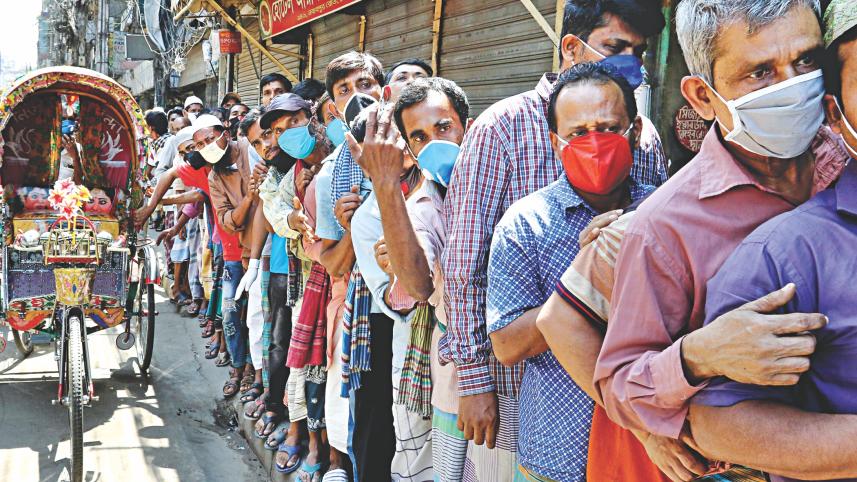‘Everything was good, then came coronavirus’

Mainul Islam was waiting by his rickshaw near an almost deserted Nakhalpara Rail Gate in the capital for over 20 minutes.
The man, aged over 40, readily agreed when asked for a ride and did not even ask to know the fare.
"You are the first passenger I got after my lunch," he said around 4:00pm yesterday.
Only two weeks ago, he and his wife, a domestic staff, used to make enough to feed themselves and support his mother and two school-going sons in his village home in Gaibandha sadar.
"Everything was going fine. Then came something called corona and changed our lives," Mainul said.
He is among the thousands of people who are suddenly finding it difficult to make a living after the government began a 10-day shutdown to contain the spread of coronavirus.
Thousands of people left Dhaka ahead of the shutdown and most of those still in the city are barely leaving home.
Many day-labourers and low-income people like Mainul did not leave the city fearing that they would not be able to find work in the village.
Mainul, who owns his rickshaw, used to earn Tk 600-700 a day and his wife Tk 7,000-8,000 a month.
"I am earning about a third of what I used to while my wife has become unemployed with only half-a-month's salary.
"I have to pay Tk 3,000 to the landlord in a few days while bearing daily expenditures is an uphill task now. I don't know how I'll pay rent," he said.
Munira Begum, a 45-year-old domestic staff in Jigatola, used to work for five families. Her employers fired her in the middle of the month.
"Of the five families I worked for, only two paid the entire month's salary of Tk 1,500. The three other families has not paid yet," she said.
"Two of my employers said they themselves faced economic hardship due to coronavirus," said the widow.
"I have to pay Tk 2,200 in rent. The landlord would not hear about my misfortune. How will I feed my three children in the coming days?"
Munira and three other domestic staffwere roaming about at Notun Rasta in Jigatola area yesterday asking people for food or alms.
Another rickshaw puller, Shafiq, said he left home with his rickshaw around 3:00pm as he heard that law enforcers harass people on the street in the morning.
"There is hardly anybody on the road now, I earned only Tk 100," he said around 11:00pm on Saturday.
"How will my family of four survive if the present situation persists?" he asked.
Boatmen at Sadarghat Launch Terminal have been facing similar challenges. Over a couple of thousand boatmen work on a daily basis between Postagola to Babubazar bridge areas.
Ranjan Mia, a dinghy owner, said he used to earn Tk 500-700 a day. But he has been making at most Tk 150 over the last few days.
"Nobody cares about us," he said.
Meanwhile, Bangladesh Road Transport Workers' Federation, an alliance of transport worker unions, demanded rationing programmes for food and other essentials for the workers.
The federation's acting president Shajahan Khan and General Secretary Osman Ali in a statement on Friday said around 50 lakh transport workers were rendered unemployed after the government suspended operation of public transport on March 26.
Most of these workers live from hand to mouth and they need support, Osman Ali told this newspaper last night.
"So, we demand that the government launch a rationing system for transport workers. Each kg of rice for them should be Tk 10 and other essentials should also be cheaper for them," he added.
They also demanded a stimulus package for the transport sector.
"We will place the demands before the road transport and bridges ministry tomorrow [today]."





 For all latest news, follow The Daily Star's Google News channel.
For all latest news, follow The Daily Star's Google News channel.
Comments